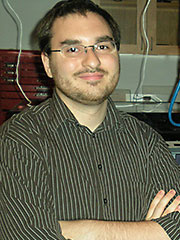Andrew Fidler
Uncovering the Power of Photosynthesis
By Stacy Kish on August 4, 2010

Andrew Fidler in the lab.
Fellow: Andrew Fidler
Hometown: Rochester Michigan
Undergrad: Albion College
Graduate school: University of Chicago
Keywords: Department of Energy, American Recovery and Reinvestment Act, Office of Science, Graduate Fellow program, Solar, Photosynthesis
Take a biology class and you learn that green plants harvest the Sun’s energy using the green pigment chlorophyll. But how exactly does this tiny green pigment absorb solar energy and manage to do it so efficiently?
This is exactly the question that Andrew Fidler hopes to solve. “Photosynthesis, the process by which sunlight is captured and converted into chemical energy by a plant, is incredibly efficient,” begins Fidler. “I am looking at photosynthetic compounds to figure out what makes them so efficient, which could have huge implications in the field of solar energy.”
Fidler, a doctoral candidate at the University of Chicago and a DOE Office of Science Graduate Fellow, was deeply influenced by his grandfather, a physical chemist. “He was always trying to inspire us and make us think about science in the world around us by devising experiments for us such as growing mold on bread and then having us look at it under a microscope,” he said.
Today Fidler is shining light at plant and bacterial compounds to figure out this mystery. The compounds being illuminated are actually protein complexes that contain tens to hundreds of chlorophyll pigment molecules. “Simply put, I am interested in understanding the color of light (wavelength of energy) that goes in and comparing it to the color of light (the wavelength of energy) that is goes out of a system,” he said. "In this way we can effectively watch to see how these complexes efficiently shuttle energy around the protein complexes."
Ultimately, understanding how these compounds work could be duplicated in synthetic systems, like solar cells, to collect incoming solar radiation in an efficient and controllable way.
Fidler concludes, “This fellowship is a prestigious and recognition by the Department of Energy will be beneficial throughout my career.” Fidler’s graduate fellowship is funded by the American Recovery and Reinvestment Act of 2009.
Stacy Kish is a Science Writer with the Office of Science.


